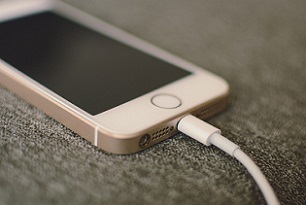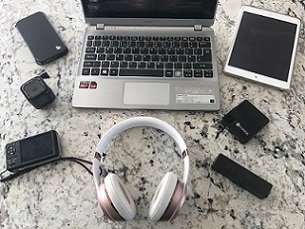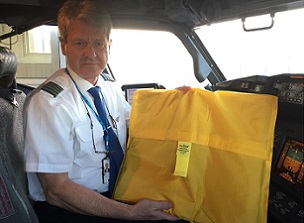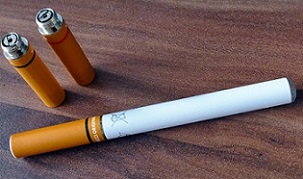 Always make sure you use manufacturer-approved chargers specifically designed for the device
Always make sure you use manufacturer-approved chargers specifically designed for the device
 All these everyday personal electronic devices are powered by lithium-ion batteries
All these everyday personal electronic devices are powered by lithium-ion batteries
 A lithium fire in the enclosed space of an aircraft passenger cabin will give off toxic smoke
A lithium fire in the enclosed space of an aircraft passenger cabin will give off toxic smoke
 An AvSax lithium batter fire mitigation bag which is now on almost 17,000 aircraft worldwide
An AvSax lithium batter fire mitigation bag which is now on almost 17,000 aircraft worldwide
 E-cigarettes are a known cause of lithium fires
E-cigarettes are a known cause of lithium fires
 There are many cases of e-scooter lithium batteries starting fires
There are many cases of e-scooter lithium batteries starting fires
An insurance giant has revealed that one in nine people in the UK have suffered a fire or explosion in their home caused by a lithium-ion battery or device.
The shocking research by Aviva also reveals that double that number – 10% of people – have had a personal electronic device such as a mobile phone, e-cigarette or iPad overheating.
These incidents have led to a 7% surge in Aviva customer claims for fires started by lithium-ion batteries which are also used for e-scooters, e-bikes and power tools.
The research, which looked at fire claims across 2022 and 2023, includes a significant house fire started by an e-cigarette being charged with an incompatible charger, extensive fire damage to a house after an e-bike with a second-hand battery was left charging unattended in a bedroom, a phone which exploded during charging after getting wet, an annexe which was destroyed by fire after batteries were left charging unattended and fire in a garage after a faulty charger was used to charge a remote control car.
One person to suffer the trauma of a lithium fire is 57-year-old Ian, a customer assistant from the Isle of Wight.
He said: “I was charging my headphones next to me on the sofa and, without realising, accidentally plugged them in using an incorrect charger. The light didn’t illuminate properly, but I still thought they were charging.
“After about five minutes the headphones started smoking and within seconds both the headphones and the battery case exploded. The metal and plastic from the headphones then melted to the sofa and set it ablaze.
“Luckily, I was able to put the flames out but I had a shock and have been left with a burn hole in my sofa. I dread to think what would have happened if I had been asleep or was not in the property as there is no doubt the sofa and house would have gone up in flames.”
Worryingly, despite around 43.2 million people in the UK owning a device that contains a lithium-ion battery, the research showed that more than two in five adults (41%) don’t know what a lithium-ion battery is and more than two fifths (42%) are unaware of the fire risks associated with charging them.
More than seven in 10 adults (71%) don’t know the warning signs of a lithium-ion battery that is about to fail such as overheating, poor performance and bulging or leaking batteries.
Hannah Davidson, Senior Underwriting Manager at Aviva, says: “For the majority of people, devices powered by lithium-ion batteries such as mobile phones, laptops, power tools and e-bikes are safe to use. However, these batteries can present a significant fire risk if the battery fails, is faulty or is charged incorrectly.
“Likewise, with consumers buying lithium-ion batteries and lithium-powered devices from second-hand retailers or sellers there is increased potential for batteries to be damaged or faulty on purchase, for the battery in the device to be different to the original or for the charger supplied with the device to be the incorrect charger.
“Fires caused by lithium-ion batteries can devastate a property and are more difficult to extinguish.
“Taking simple steps such as always using a manufacturer recommended battery, following safe charging techniques and knowing how to spot the early warning signs of a potential battery fire can make a real difference.”
Aviva claims data highlights a worrying trend of unsafe practices leading to fires with numerous fires starting due to customers using the wrong charger for the battery or device, overcharging their devices or leaving batteries and devices unattended while charging.
The research also revealed that more than 1 in 10 people (13%) - over seven million Brits - don’t have a smoke alarm or any other fire safety devices.
The problem is most acute on passenger planes. The last place you want a lithium battery fire giving off toxic smoke is in the confined space of an airplane cabin at 35,000ft which is why there are now almost 17,000 AvSax lithium fire mitigation bags on board aircraft operated by more than 100 airline companies worldwide. AvSax (https://avsax.com/) were devised and are made by UK company Environmental Defence Systems Ltd based in Huddersfield, West Yorkshire and won the Queen’s Award for Enterprise for their innovation.
Aviva top tips for lithium-ion battery safety:
Following these tips can help extend the life of the battery and reduce the risk of battery fires.
Charging lithium-ion batteries and devices safely: